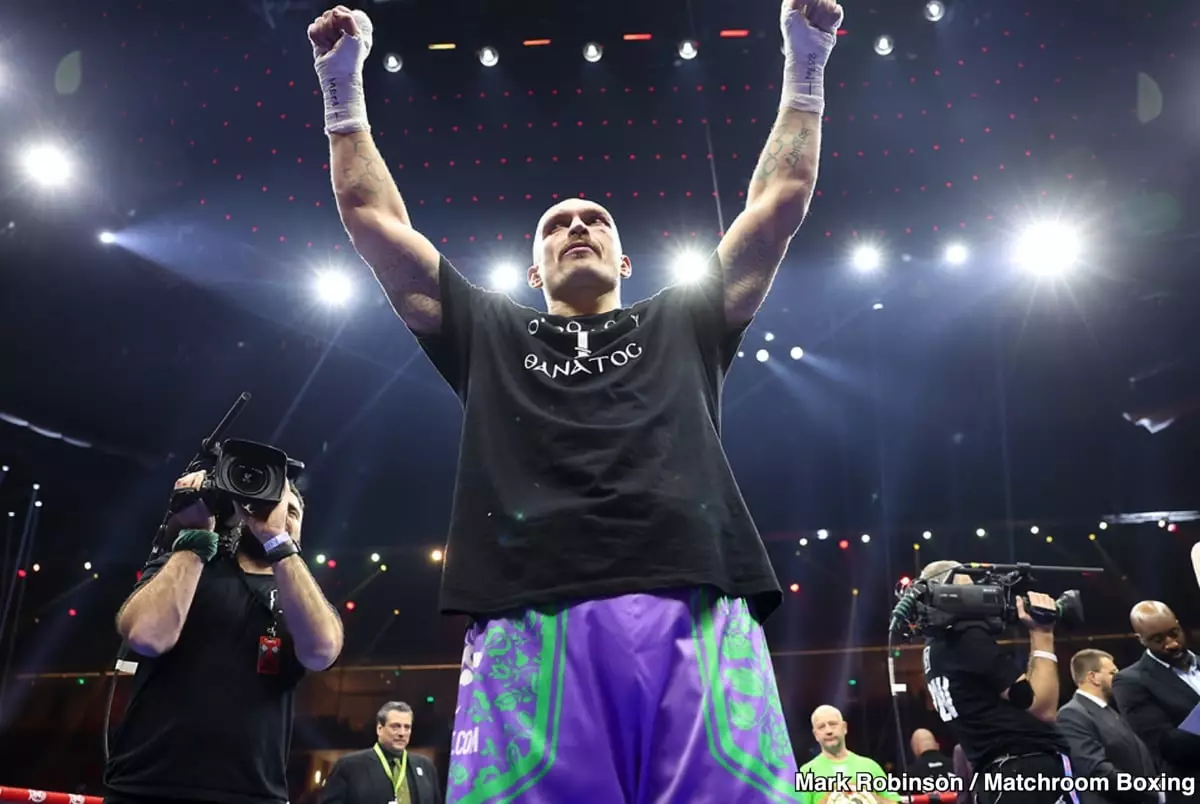The world of boxing is no stranger to differing opinions and heated debates, especially when it comes to the legacy of its top fighters. One such figure at the center of this discourse is Oleksandr Usyk, the reigning heavyweight champion. While many analysts and former champions shower Usyk with praise, labeling him an all-time great, former champion Tim Bradley offers a starkly contrasting view. This article delves into the complexities of Usyk’s standing in boxing history, examining both the accolades and the criticisms.
Oleksandr Usyk has marked his name in the annals of boxing as a remarkable talent. He made history by unifying the cruiserweight division before transitioning to the heavyweight ranks, where he achieved further success by defeating heavyweight giants Anthony Joshua and Tyson Fury. Proponents of Usyk’s greatness point to his extraordinary skill set, impressive winning streak, and ability to triumph in the challenging environments of his opponents.
Usyk’s achievements as an amateur boxing star cannot be overlooked; with an amateur record of 335 wins to just 15 losses, he amassed a plethora of titles, including Olympic gold. These accomplishments, positioned alongside his professional feats, create a compelling narrative of a fighter who has effectively “cleaned out” divisions, claiming virtually all available belts.
In stark contrast, Tim Bradley stands as a vocal critic of the sweeping declarations of Usyk’s greatness. He questions the legitimacy of labeling the Ukrainian as an all-time great given his relatively short and limited heavyweight career, wherein Usyk has only had seven fights. Bradley’s assertion that Usyk’s two victories against the top heavyweights do not automatically secure him a place in the pantheon of boxing legends raises a critical examination of the criteria used to judge greatness in the sport.
Bradley’s skepticism may stem from a deeper understanding of what constitutes an “all-time great.” Is it the number of fights, the level of competition faced, or the ability to retain titles over many years? By focusing on the quantity of fights rather than the quality of accomplishments in those fights, Bradley introduces an important aspect to the debate—one that reveals the subjective nature of greatness in boxing.
Critics of Bradley’s position might argue that Usyk’s quick ascension through both cruiserweight and heavyweight ranks demonstrates remarkable prowess. The fact that he unified the heavyweight division after only six fights is an extraordinary feat rarely seen in boxing history. Moreover, his ability to dethrone two men—Joshua and Fury—who have been considered among the best in the division for years elevates his status considerably.
The critique that Usyk has not “cleaned out” the heavyweight division raises further questions. What more must a fighter do to earn respect? Even if Usyk is obliged to face figures like Daniel Dubois or Joseph Parker, could it be argued that his legacy is already cemented by his existing successes? Furthermore, Usyk’s willingness to fight in opponents’ backyards showcases not only bravery but also a commitment to the sport that is often lost in discussions about legacy.
The discussion surrounding Usyk demonstrates a crucial reality within sports—greatness is often a subjective measure. For every celebrated fighter, there are dissenting voices that challenge their merit. Bradley’s critique, while seemingly harsh, reflects a desire for clarity and accountability in a sport laden with accolades that can fizzle under scrutiny.
Perhaps the answer lies in a more nuanced definition of greatness that encompasses not just achievements and accolades but also the fighter’s contributions to the sport, resilience, and the enduring impact they leave behind. Can Usyk’s remarkable style, sportsmanship, and ability to unite fans—not just by winning but by how he embodies the sport’s values—serve as hallmarks of an all-time great?
As the boxing community continues to mull over Usyk’s legacy, it is evident that discussions regarding greatness are as multifaceted as the sport itself. While critics like Timothy Bradley raise valid points that would encourage further introspection, supporters of Usyk contend that his accomplishments speak volumes. Ultimately, the debate may serve as a testament to the rich tapestry of boxing history, where every fighter’s story is uniquely shaped by triumphs, challenges, and the perceptions of those who bear witness to their journey. In the end, greatness remains a narrative still in the making, and for Oleksandr Usyk, this narrative is far from over.

